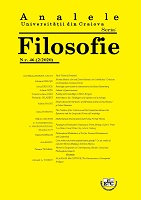LEIBNIZ’S QUASI-MONISM
LEIBNIZ’S QUASI-MONISM
Author(s): Adrian NitaSubject(s): Metaphysics, Early Modern Philosophy
Published by: Editura Universitaria Craiova
Keywords: early modern philosophy; Leibniz; corporeal substances; substantial forms; monads; quasi-monism; disclosed metaphysics; hidden metaphysics;
Summary/Abstract: I will interpret Leibniz's monadology as “quasi-monism”, or “nearly monism”, or, from another perspective, a Monism of a special kind. The “quasi monistic” thesis is as follows: the man is a Monad, that is, a simple substance endowed with perception, appetition, memory and reason; a closer look shows that man is soul and body; at a deeper level, we find form and matter; even deeper, we have a substantial form united to a primary matter; deeper more, one finds active force and primitive passive force and soon to infinity. This is the reason and context on which I intend to do a reverse chronological reading, from the writings of 1716 to the writings of 1695, in order to see the exciting game of two kinds of metaphysics: disclosed metaphysics and hidden metaphysics.
Journal: ANALELE UNIVERSITĂȚII DIN CRAIOVA. SERIA FILOSOFIE
- Issue Year: 2/2020
- Issue No: 46
- Page Range: 47-60
- Page Count: 14
- Language: English

